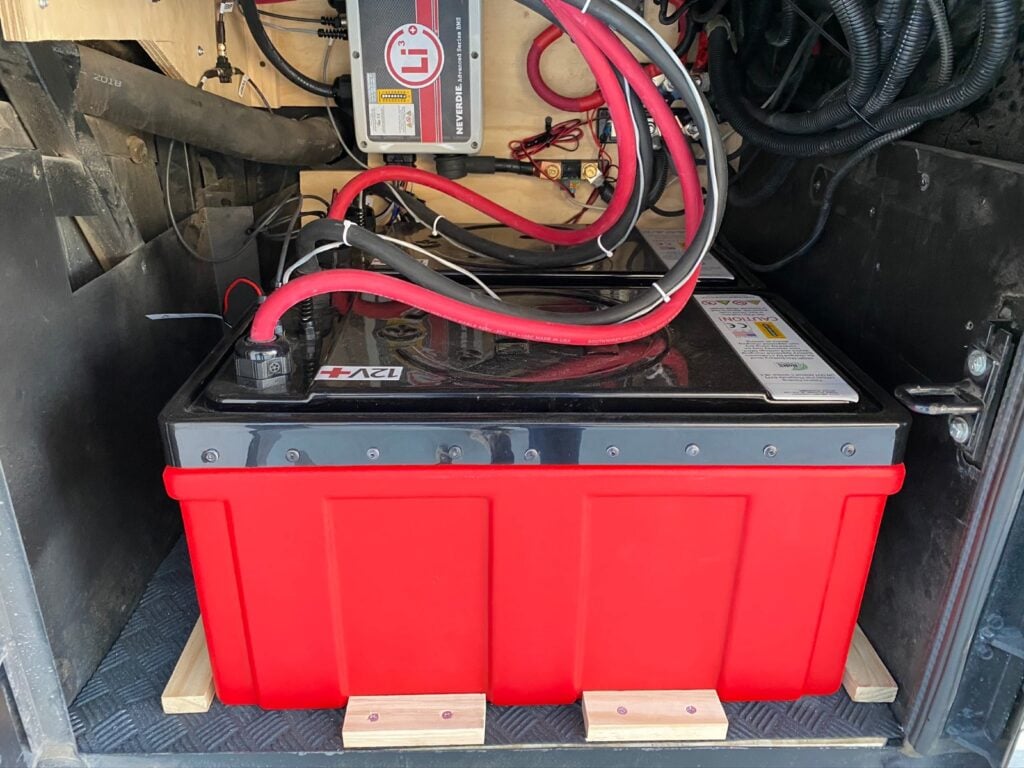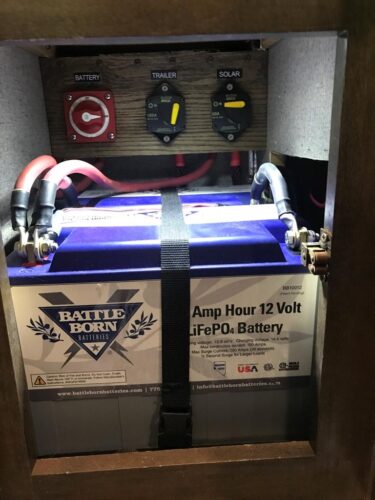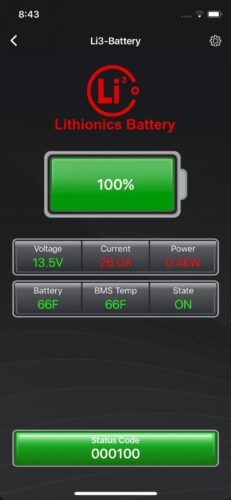Are Your Stored LiFePO4 Batteries Safe During Freezing Temperatures?
When I was first asked to write an article on how to keep stored LiFePO4 batteries safe during freezing temperatures I was going to decline, as my RV still has lead acid batteries. However, like many of you, I hope to upgrade to LiFePO4 batteries very soon. And since there seems to be much confusion on this subject, I knew sooner or later I would need to educate myself. So I decided to take on the subject now.

What I now understand will provide me with the knowledge to purchase the appropriate LiFePO4 batteries for my needs. Plus, I now know how to properly store them during freezing temperatures, and you will too.
What Does LiFePO4 Mean?
“LiFePO4” describes a type of battery: Lithium (Li) Iron (Fe) and Phosphate (PO4).
Currently, like many of you, I have two lead acid batteries serving as my house batteries on my travel trailer.
Several years ago, I wrote an article entitled Protect Your RV Batteries While in Winter Storage. That article dealt with lead acid batteries rather than LiFePO4 batteries. Many of the steps shared in that article are appropriate for LiFePO4 batteries as well as lead acid batteries. However, one step shared in the article, while appropriate for lead acid batteries, can severely damage LiFePO4 batteries. This appears to be one of the areas that creates confusion, so now I will clear it up.
The Two Ways that Storing LiFePO4 Batteries and Lead Acid Batteries in Winter are Similar
Just like lead acid batteries, the following two steps apply to LiFePO4 batteries:
What happens if an RV battery charge drops during storage?
Lead acid batteries, of all types, self-discharge when in storage much faster than LiFePO4 batteries. Therefore, charged LiFePO4 batteries will retain much more of their charge while in winter storage than their lead acid counterparts. This is important to know. Here’s why:
The Bottom Line: A well-charged* LiFePO4 battery in winter can survive storage in freezing temperatures with no extra attention. In other words, charge it, disconnect it, and forget it.
*Many of the lithium battery manufacturers recommend simply charging them up to between 50% and 100%, disconnecting them from your RV electrical system via the battery ON/OFF switch, and leaving them alone.
The Important Difference Between Safe Winter Storage of LiFePO4 Batteries Versus Lead Acid Battery Storage
Now for the big difference between winter storage of LiFePO4 batteries, or putting lead acid batteries in storage.
Some RVers utilizing lead acid batteries, me included, have the luxury of shore power where they store their RV. This provides them with the ability to keep their RV house batteries charged while stored during freezing temperatures. As the mentioned article details, a fully charged lead acid battery won’t freeze thereby protecting the battery from damage.
While providing a charge to a lead acid battery during freezing temperatures is appropriate, it has the potential to destroy a LiFePO4 battery. Here’s why:
When trying to charge a LiFePO4 battery below 32°F/0°C, a chemical reaction known as “lithium plating” or “lithium dendrite growth” occurs.
Some manufactures claim that their LiFePO4 batteries are easy to charge in freezing weather. Just charge them at very low rate. But most all battery experts recommend against it.
To keep your LiFePO4 battery safe in freezing temperatures, just charge and disconnect.
As stated above, for winter storage purposes, just charge* your LiFePO4 battery, disconnect it and you are fine until spring. Remember not only to disconnect it from loads that will draw the battery down, but from charging systems, including solar, as well.
- Note: Some manufacturers recommend storage no lower than -4 degrees F others say you can as low as -15 degrees F. Always read and follow the manufacturer instructions. If in doubt, remove the batteries and store them in a warm environment during extreme periods of freezing.
So why all the confusion regarding storing LiFePO4 batteries during freezing temperatures?
Manufacturers of LiFePO4 lithium batteries commonly specify an effective temperature range of -20°C to +55°C (this may differ across various brands and models). However, it is important to note that there is a common misunderstanding surrounding this range. Many RVers assume that it applies to both charging and discharging processes, but this is incorrect.
- In reality, the operational temperature range solely pertains to the discharging of the battery, not the charging of the battery.
While outside the scope of this article, if you do need to charge your LiFePO4 batteries when they are below 32°F/0°C, you need to warm them up first. Let’s explain how.
The two ways to warm up LiFePO4 batteries
Just heat the RV if you store them inside a cold camper. Or, rely on a BMS (battery management system). Here’s how both ways work:

Note: Unlike lead acid batteries that “off gas” when charging, LiFePO4 don’t off gas making them safe to mount within the enclosed portion of the RV.
BMS typically also allows you to read the temperature of the batteries letting you know when it is safe to charge if not equipped with heaters.

Simply wait for the temperature to rise during the day. Install a combination of heating pads along with insulation to warm them and keep them warm. Then disconnect the LiFePO4 batteries, and carry them into a heated environment for charging.
Conclusion: The Best Way to Keep LiFePO4 Batteries Safe During Freezing Temperatures
LiFePO4 batteries are easily stored over the winter during freezing temperatures, with minimum effort or concern. However, be aware that charging them when they are below freezing can damage them if not done correctly.
Remember, features of LiFePO4 batteries differ between brand and models. Always read and follow manufacturers instructions to get the best performance from your battery as well as operating them safely while preserving the warranty.
Related Articles
Goldenmate Lithium Battery Review: Boost Your RV Power
Lithium RV Battery vs Lead Acid: What’s The Difference?
Product Review: Growatt INFINITY 1300 LiFePO4 Power Station
The post Are Your Stored LiFePO4 Batteries Safe During Freezing Temperatures? appeared first on RV LIFE.






